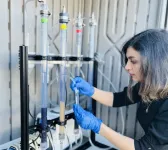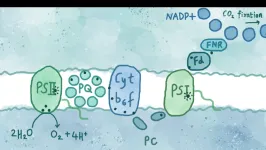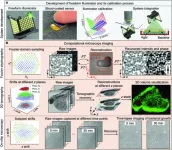(Press-News.org) Indiana University School of Medicine is accepting nominations until May 1 for the 2024 August M. Watanabe Prize in Translational Research.
The Watanabe Prize is one of the nation’s largest and most prestigious research awards recognizing senior investigators focused on shepherding scientific discoveries into new therapies for patients. Nominees should be members of the scientific or medical communities who have demonstrated outstanding accomplishments in translational research.
The winner will receive $100,000 and will spend Sept. 18-20, 2024, in Indianapolis as a vising dignitary, sharing insights and knowledge with audiences at IU School of Medicine and its partner institutions. The winner will also be the keynote speaker for the 2024 Indiana Clinical and Translational Sciences Institute Annual Meeting.
Nomination process:
Submit the following complete nomination materials to amwprize@iu.edu with the nominee’s name in the subject line:
A copy of the nominee’s current curriculum vitae (CV).
A letter of nomination, including a detailed description of the nominee’s major translational research accomplishments and the impact of these contributions to the fields of science and/or medicine. Letters should be submitted on official letterhead and signed by the nominator.
Note: The 2024 nominee must be available to travel to Indianapolis from Sept. 18-20, 2024.
The deadline for all nomination materials is May 1. Please email any questions about the nomination process to amwprize@iu.edu or call 317-278-2874.
The Watanabe Prize is named in honor of the late August M. Watanabe, a titan in the field of translational research in both academia and industry, who impacted the health of people around the world as a leader at IU School of Medicine and Eli Lilly and Company.
Watanabe began his career at Indiana University in 1972 and served as chair of the Department of Medicine from 1983 to 1990. From there, he joined Eli Lilly and Company, where he was ultimately named executive vice president, overseeing the launch of 11 drugs and doubling the size of the company’s research and development organization.
Past Watanabe Prize recipients include Huda Zoghbi, MD (2023); Adrian R. Krainer, PhD (2022); Nancy J. Brown, MD (2021); Brian Druker, MD (2020); David Holtzman, MD (2019); Jean Bennett, MD, PhD (2018); Robert J. Lefkowitz, MD (2016); Carl H. June, MD (2015); and Tadataka Yamada, MD (2013).
END
Nominations sought for 2024 Watanabe Prize in Translational Research
2023-03-22
ELSE PRESS RELEASES FROM THIS DATE:
Dr. Ekta Khurana receives grant to study prostate cancer evolution
2023-03-22
Dr. Ekta Khurana, an associate professor of physiology and biophysics at Weill Cornell Medicine, has received a 3-year, $1.2 million grant from the United States Department of Defense to investigate how prostate cancer cells evolve to become resistant to hormone-blocking therapy. This work will contribute to further understanding prostate cancer and the development of effective targeted therapies for the disease.
Prostate cancer growth is dependent on androgens – male hormones such as testosterone – binding ...
New UBC water treatment zaps ‘forever chemicals’ for good
2023-03-22
Engineers at the University of British Columbia have developed a new water treatment that removes “forever chemicals” from drinking water safely, efficiently – and for good.
“Think Brita filter, but a thousand times better,” says UBC chemical and biological engineering professor Dr. Madjid Mohseni, who developed the technology.
Forever chemicals, formally known as PFAS (per-and polyfluoroalkyl substances) are a large group of substances that make certain products non-stick or stain-resistant. There are more than ...
Photosynthesis ‘hack’ could lead to new ways of generating renewable energy
2023-03-22
Researchers have ‘hacked’ the earliest stages of photosynthesis, the natural machine that powers the vast majority of life on Earth, and discovered new ways to extract energy from the process, a finding that could lead to new ways of generating clean fuel and renewable energy.
An international team of physicists, chemists and biologists, led by the University of Cambridge, was able to study photosynthesis – the process by which plants, algae and some bacteria convert sunlight into energy – ...
Simulated terrible drivers cut the time and cost of AV testing by a factor of one thousand
2023-03-22
Photos // Video
The push toward truly autonomous vehicles has been hindered by the cost and time associated with safety testing, but a new system developed at the University of Michigan shows that artificial intelligence can reduce the testing miles required by 99.99%.
It could kick off a paradigm shift that enables manufacturers to more quickly verify whether their autonomous vehicle technology can save lives and reduce crashes. In a simulated environment, vehicles trained by artificial intelligence perform perilous maneuvers, forcing the AV to make decisions that confront drivers only rarely on ...
Multiple substance use disorders may share inherited genetic signature
2023-03-22
A new study suggests that a common genetic signature may increase a person’s risk of developing substance use disorders, regardless of whether the addiction is to alcohol, tobacco, cannabis or opioids. The research, led by Washington University School of Medicine in St. Louis, eventually could lead to universal therapies to treat multiple substance use disorders and potentially help people diagnosed with more than one.
Published March 22 in the journal Nature Mental Health, the study’s findings are drawn from an analysis of genomic data from more than 1.1 million people of mostly European ancestry and a smaller ...
How vision begins
2023-03-22
Researchers at the Paul Scherrer Institute PSI have deciphered the molecular processes that first occur in the eye when light hits the retina. The processes – which take only a fraction of a trillionth of a second – are essential for human sight. The study has now been published in the scientific journal Nature.
It only involves a microscopic change of a protein in our retina, and this change occurs within an incredibly small time frame: it is the very first step in our light perception and ability to see. It is also the ...
New NIH study reveals shared genetic markers underlying substance use disorders
2023-03-22
By combing through genomic data of over 1 million people, scientists have identified genes commonly inherited across addiction disorders, regardless of the substance being used. This dataset – one of the largest of its kind – may help reveal new treatment targets across multiple substance use disorders, including for people diagnosed with more than one. The findings also reinforce the role of the dopamine system in addiction, by showing that the combination of genes underlying addiction disorders was also associated with regulation of dopamine signaling.
Published ...
Surprisingly simple explanation for the alien comet 'Oumuamua's weird orbit
2023-03-22
In 2017, a mysterious comet dubbed 'Oumuamua fired the imaginations of scientists and the public alike. It was the first known visitor from outside our solar system, it had no bright coma or dust tail, like most comets, and a peculiar shape — something between a cigar and a pancake — and its small size more befitted an asteroid than a comet.
But the fact that it was accelerating away from the sun in a way that astronomers could not explain perplexed scientists, leading some to suggest that it was an alien spaceship.
Now, a University of California, Berkeley, astrochemist ...
Smaller, denser, better illuminators for computational microscopy
2023-03-22
Seeking to expand the possibilities offered by programmable illumination, a group of researchers at the University of Connecticut developed a strategy for constructing and calibrating freeform illuminators offering greater flexibility for computational microscopy. Their calibration method uses a blood-coated sensor for reconstruction of light source positions. They demonstrated the use of calibrated freeform illuminators for Fourier ptychographic microscopy, 3D tomographic imaging and on-chip microscopy and used a calibrated freeform illuminator in an experiment to track bacterial growth.
The group’s research was published Feb. 20 in Intelligent Computing, a Science ...
Binghamton University reaches highest ever score for LGBTQ+ inclusion
2023-03-22
BINGHAMTON, N.Y. -- Binghamton University, State University of New York scored a nearly perfect ranking on the latest national Campus Pride Index, which measures a university’s commitment to LGBTQ+ safety and inclusivity on campus. The University received a 4.5 out of 5, an increase from the 3.5 scores received in previous years.
Nicholas Martin, assistant director of the LGBTQ Center at Binghamton University, sees this as a reflection of the organization’s dedication and Binghamton’s real commitment to outreach.
“Our ...





